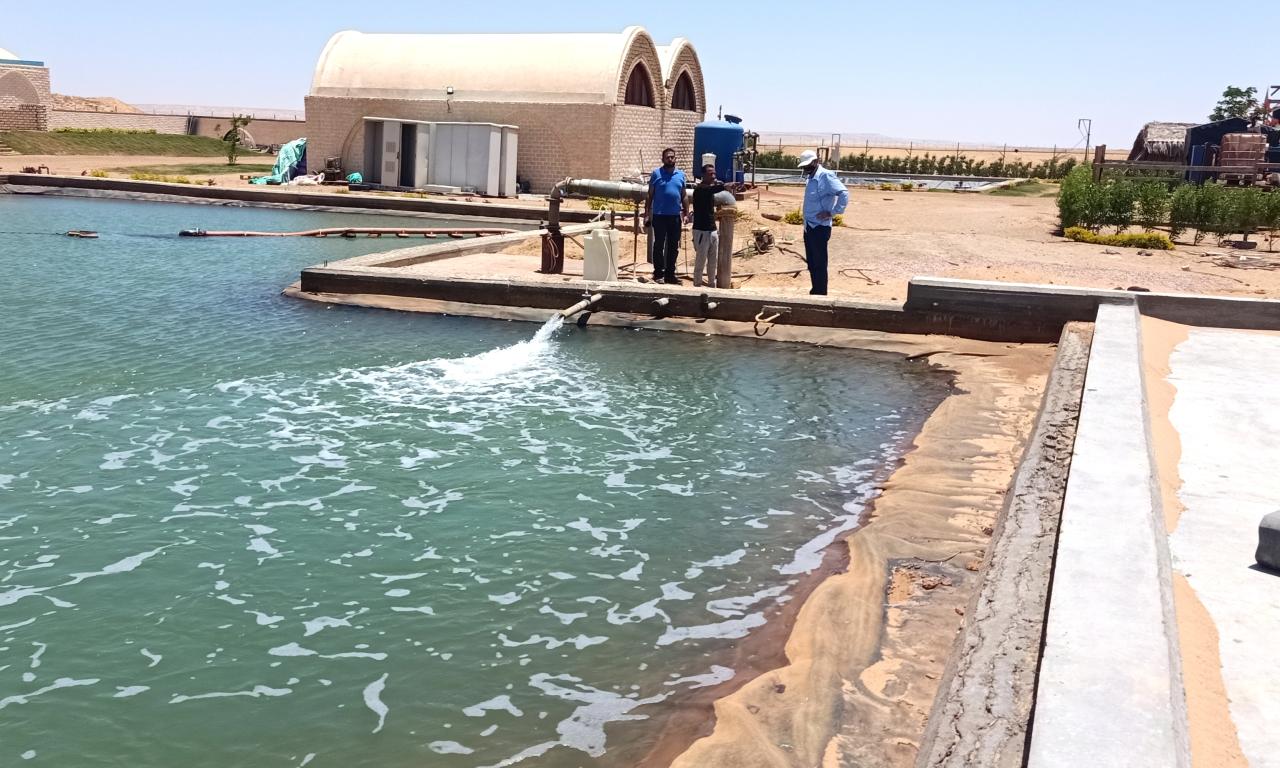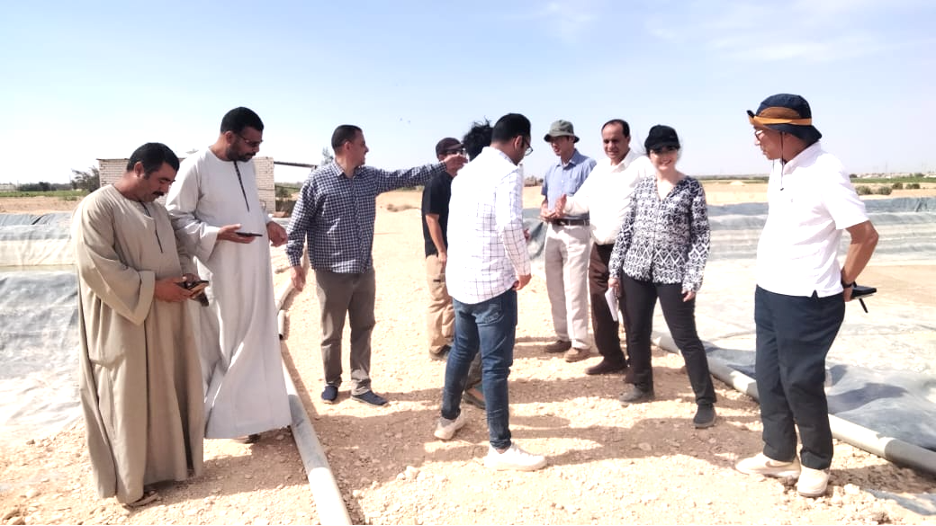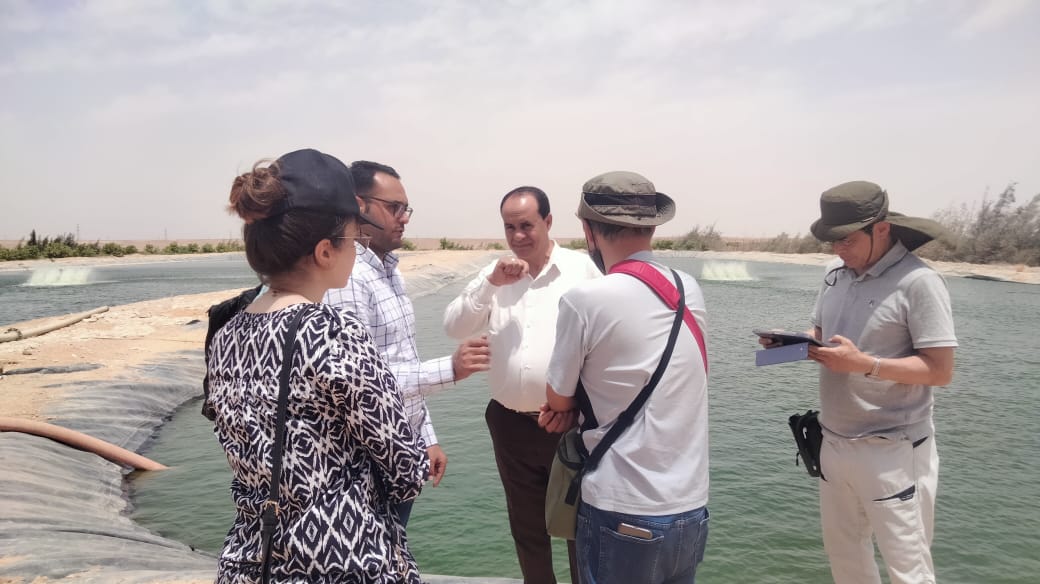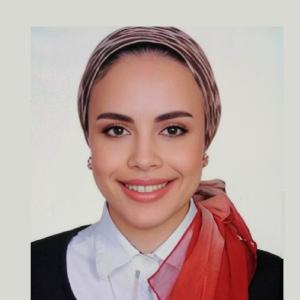
Integrated Agriculture-Aquaculture (IAA) is important for improving water use efficiency in dry land areas. Through CGIAR initiative on Fragility to Resilience in Central and West Asia and North Africa (F2R-CWANA), WorldFish is conducting studies and providing technical support to IAA farms in Egypt. The F2R-CWANA initiative is a collaborative effort among several CGIAR centers, including ICARDA, IWMI, IFPRI, and WorldFish.
Recently, WorldFish under the flagship of F2R-CWANA Initiative, facilitated a two-day technical field visit to four aquaculture farming sites located in Minya governorate, Upper Egypt. The objective was to support a delegation from Lakes and Fish Resources Protection and Development Agency (LFRPDA) and Japan International Cooperation Agency (JICA) to explore IAA farms and facilitate connections with them. This strategic partnership capitalizes on WorldFish’s extensive expertise in delivering technical support to integrated farms across Egypt. The visits also contributed to the implementation of —Promoting Sustainable and Resilient Aquaculture for Economic Development in Egypt (Pro-Sure-Aqua) project, a 3-year project funded by JICA to bolster aquaculture development within the country.
Promoting IAA Interventions in Egypt
Desertification poses a substantial environmental challenge in Egypt, adversely affecting both land productivity and agricultural sustainability. Despite an increase in land cover over the past two decades, there has been a significant loss due to land degradation, highlighting the urgent needs for improved management practices for wetlands and water bodies, particularly in light of the potential risks to croplands in the Nile Delta.
The adoption of IAA systems in Egypt remains relatively low, primarily due to challenges in water management, labor and the capital investments required for implementing these systems. Although IAA systems have the potential to optimize water usage and provide a range of social, economic, and environmental benefits is acknowledged, many farmers lack a thorough understanding of how to effectively balance the water requirements between the aquaculture and agricultural components of these systems.

Since 2021, WorldFish under the F2R-CWANA Initiative and, aligned with Egypt’s National Climate Change Strategy (NCCS) 2050, has been promoting the adoption of IAA systems. These efforts include maintaining a robust database and promoting both practical and scientific dialogue among government and private sector stakeholders. During the recent field visits to Mallawi district in Mineya governorate, WorldFish assessed four integrated farms, each unique size, capacity, and approach to IAA. These visits provided insights into operational efficiencies and sustainability practices. The farms demonstrated diverse strategies, from recycling nitrogen-rich wastewater for irrigation to employing solar-powered systems for sustainable production.
“By examining these varied systems, we sought to identify best practices and innovative techniques that can be replicated or adapted,” said Ashraf Sbaay, Research Assistant, WorldFish, Egypt and field visit’s facilitator.
“These visits have underscored the significant potential of (IAA) systems, particularly the synergy between fish farming and crop production. Based on the observations and insights gathered, WorldFish is catalyzing a set of future steps proposed to enhance the effectiveness and sustainability of these IAA systems in Egypt,” said Ahmed Nasr-Allah (PhD), Country Representative, WorldFish, Egypt

Insights from WorldFish Research & Development on IAA systems
In 2023, WorldFish conducted and published a comprehensive analytical assessment report of 18 IAA farms across six governates in Egypt. The farms cultivate a range of species, including Nile tilapia, mullet, red tilapia, basa, eels, and whiteleg shrimp, using irrigation systems such as drip and sprinkler irrigation. The farms field crops included alfalfa, maize, wheat, and barley, while vegetable crops consisted of onions, lettuce, and various herbs and fruit crops including tomatoes, mangoes, date palms, olives, guavas, and figs.
The report further detailed a SWOT analysis that assessed the current status and future opportunities of IAA in Egypt and included recommendations for targeted interventions, potential employment opportunities, supportive policies, and technical and managerial assistance. The report findings indicate that IAA is positioned to play a pivotal role in Egypt’s sustainable development over the next decade. Key innovations, such as integrating ICT smart sensing, optimizing resource utilization using the Internet of Things (IoT), and implementation of hybrid water management strategies in aquaculture are recommended to optimize resource use.
“These innovations represent the ideal harmony between striving for food security and advancing water security in Egypt and across the CWANA region.” said Youssef Brouziyne, Country Representative – Egypt & Regional Representative – MENA, International Water Management Institute (IWMI).
What’s Next?
WorldFish with support from F2R-CWANA support, and in collaboration with partners, is committed to advancing integrated farming practices by expanding training programs that equip farmers with essential knowledge on best practices, including effective wastewater management and synergistic fish farming techniques.
In the coming weeks, WorldFish will host two technical workshops in Egypt to facilitate networking among stakeholders and promote scientific exchange. Additionally, a comprehensive report on IAA systems in Morocco is being developed to guide future prospects in North Africa. Ongoing collaboration with national authorities will ensure that integrated farming aligns with national policies, while crop diversification will enhance resilience and profitability for farmers.
